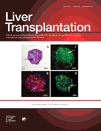The influence of seeking god in the association between religiosity and prolonged survival in liver transplant recipients
With interest I read the publication in the October issue entitled “Religiosity Associated with Prolonged Survival in Liver Transplant Recipients.”1 I am surprised that the authors, based on the data they presented, concluded that “actively seeking God is associated with better survival after transplantation” in this population, especially because the authors themselves hinted at what should have been identified as important flaws in their study in the introduction section of their manuscript.
Limiting the study population to patients that actually responded to a questionnaire on religiosity has most likely introduced a selection bias in this study. Although this might have been unavoidable, this should at the very least have been acknowledged by the authors as a limitation of the study while preferably its impact should have been assessed by comparing participants to nonresponders.
Furthermore, positive thinking and a positive attitude, with and without the influence of religion, has been suggested to improve survival rates of patients. However, this remains a topic of intense debate in relation to cancer2-6 and other diseases,7, 8 while physiological and/or biological mechanisms by which this might work remain to a large extent unknown. Although the authors touched upon this in their manuscript, they subsequently failed to recognize that this “positive attitude” can be related to a wide variety of factors of which religiosity might be one. As such, in specific populations religiosity could be correlated to attitude and serve as a proxy variable without implying causality. This hypothesis seems more likely given that the authors refer to a study showing that the effects of spirituality can already be mediated by better social support alone.9 Although their study design implies they had the chance, the authors did not acknowledge this and did not collect information on general attitude and social environment to be able to assess whether any additional influence of religiosity did exist.
Similarly, the authors themselves suggested that an association between religiosity and survival is mediated, although more likely explained, by lifestyle factors including alcohol use, smoking, sedentary lifestyles, and social environment, and that these factors have been shown to be different in religious groups compared to the general population. Unfortunately, again they subsequently did not recognize these, and other factors (for example, see Grulke et al.10), as important confounders. The authors did adjust their models for sex, marital status and educational level which are inadequate as proxies for important lifestyle factors. In addition, given their use of an extremely crude adjustment for occupation (manager, yes/no) it is also no surprise that occupation was not associated to survival after liver transplant in this study. The data do suggest a different baseline risk between patients “Seeking God” and those “Not Seeking God” expressed by a 3-fold higher risk of death from all causes in the latter group. This indicates important differences in other, most likely lifestyle, factors related to pretransplant health between both groups. When not adequately addressed, these baseline differences prohibit any conclusions on attitude, with or without the influence of a God, and survival in these patients.
Without proper adjustment for important lifestyle and social environment confounding factors it seems difficult to attribute improved survival in these patients to differences in attitude, let alone point at religiosity as the causative factor. Given the methodological flaws described here but also mentioned, but not recognized as important, by the authors, they should have adopted an epistemological more modest and careful attitude with regard to their conclusion. Even more so because studies addressing these types of hypotheses tend to get picked up in mainstream media without the nuances of a peer-reviewed scientific article.
REFERENCES
Frank de Vocht Ph.D*, * Centre for Occupational and Environmental Health, School of Community-Based Medicine, Manchester Academic Health Sciences Centre, The University of Manchester, Manchester, United Kingdom.




